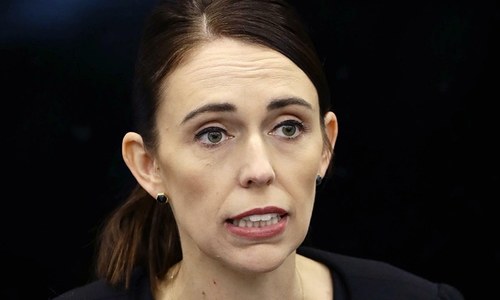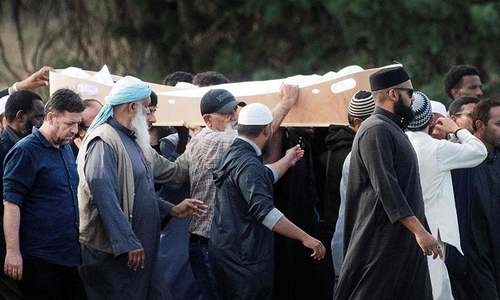The Azaan for Friday prayers rang out across New Zealand followed by two minutes of nationwide silence as a show of support for the 50 victims of last week's terror attack on Christchurch mosques.
As the call was broadcast around the country, thousands — including Prime Minister Jacinda Ardern and wounded survivors — stood in a park opposite the mosque where the killing began, as the nation of 4.5 million came to a standstill.
A prayer leader in white skullcap issued the call to regular Friday prayers at 1.30 pm as thousands listened in Christchurch's Hagley Park, across from the Al Noor Mosque.
The country then fell silent for two minutes, with public gatherings in Auckland, Wellington and other cities.
In neighbouring Australia, people stopped in the streets and in shops to mark the moment.
Al Noor imam Gamal Fouda then took to the lectern at Hagley Park to denounce the "evil ideology of white supremacy" and praise Kiwis for their support.
"I look out and I see the love and compassion in the eyes of thousands of fellow New Zealanders and human beings from across the globe," Fouda said.
"This terrorist sought to tear our nation apart with an evil ideology... But, instead, we have shown that New Zealand is unbreakable."
“New Zealand mourns with you. We are one,” Prime Minister Ardern said in a short speech.
Eight Pakistanis were also among those laid to rest in Christchurch today.
Foreign Office spokesperson Dr Mohammad Faisal said that over 5,000 people attended the funerals, of which just 1,500 were Muslim. Over 20 family members of the victims travelled to New Zealand from Pakistan to attend the funerals of their loved ones.
The burials were in accordance with Islamic rituals, Dr Faisal tweeted.
One of the victims, Syed Areeb Ahmed, will be repatriated to Pakistan over the next few days, the FO spokesperson added.
Also read: ‘RUN!’: New Zealand shooting victims recount horror, mourn the lost
The Al Noor mosque remains closed as workers repair bullet-pocked walls and clean blood-spattered floors.
But after Friday's prayers, the sombre mood outside lightened markedly as non-Muslims approached the mosque to lay flowers or embrace and take selfies with Muslims.
Koro Tini, a 46-year-old Maori man with elaborate traditional facial tattoos and ceremonial native cloak, embraced and touched noses with a man who was among a group of Muslim worshippers.
"We weren't meaning to pose for pictures but people wanted to do it after the prayers. There’s a sense of joy and rejoicing," Tini said.
New Zealand is still in shock following the killings by alleged shooter Brenton Tarrant, a 28-year-old Australian national who had hoped to foment an ethnic war with his attacks.
But horrified Kiwis have responded with outpourings of love, with many embracing their Muslim neighbours on Friday in moving scenes across the country.
'Hate cannot win'
Many women across the country wore headscarves in solidarity with Muslims.
"I can take my scarf off if I feel afraid. They cannot," said Kirsty Wilkinson, who came to Hagley Park with two friends, all in make-shift hijabs.
"The message I want to send is that hate cannot win."
Tarrant took advantage of relatively lax New Zealand gun laws to acquire military-style weapons that he used to mow down 50 men, women and children — ranging in age from three years to 77 — and leaving dozens injured in an attack live-streamed online.
New Zealand police revealed on Friday that in October 2017 they met with Tarrant at his home and conducted a "security inspection" as part of the gun licence approval process.
The "correct process" was followed and the licence was granted, a police statement said.
Tarrant is in police custody and has been charged with murder.
Prayers and pause
Major New Zealand newspapers published special tributes on Friday, with the front page of Christchurch daily The Press bearing the Arabic word "Salam" (Peace) and the names of the 50 killed.
The national mourning and moment of silence were broadcast on television networks, radio and across multiple local media websites.
"We are so happy that this prayer will be broadcast to the entire world so that everyone can be part of it," Mustafa Farouk, president of the Federation of Islamic Associations of New Zealand, said in a statement announcing the prayer session.

Burials also resumed Friday in Christchurch, with 26 people expected to be laid to rest, ranging from three-year-old Mucaad Ibrahim to 77-year-old Muse Awale.
Salwa Mustafa, who lost her husband Khalid and 15-year-old son Hamza in the massacre, had defiant words despite her devastating loss.
"People say that... Muslims are terrorists. The whole world saw who is the terrorist," she said of the shooter.
"Muslims are people of peace and love, not terrorists. And I hope the whole world now can understand the real Islam, the reality of Islam."
Hundreds of citizens call police to turn in weapons after ban
Hundreds of New Zealanders contacted authorities to hand in their guns within hours of Prime Minister Jacinda Ardern announcing a ban on military-style weapons following the Christchurch mosque massacres, police said Friday.
But police also said that some people were trolling their website with "fake" applications to hand in weapons covered by the ban, which took effect at 3:00 pm Thursday (0200 GMT).
Responding to the slaughter of 50 Muslim worshippers a week ago by a self-avowed white supremacist, Ardern´s government outlawed semi-automatic weapons, assault rifles, high-capacity magazines and parts that can modify weapons to make them deadlier.
The gunman, an Australian citizen living in the southern New Zealand city of Dunedin, had legally purchased the weapons, including two modified semi-automatic rifles, used to carry out the massacre.
The crackdown applies to new gun purchases but also effectively rendered illegal the targeted weapons already in the hands of New Zealanders.
Ardern said these would be subject to an amnesty and buyback programme, but that people should immediately begin the process of surrendering the arms to police.
In the first 20 hours after the ban took effect, nearly 500 people had called a special hotline set up by police for people to arrange the gun hand-ins, Assistant Police Commissioner Tusha Penny said.
More than 1,000 people also notified police online that they wanted to give up their guns.
But while the gun reform had wide support among both the governing and opposition political parties, some critics expressed their disgruntlement by filing "vexatious" forms online, Penny said.
"While these individuals may be short of productive work to do, police are not," she said. "In the current environment, this is unacceptable."
Police have estimated there are at least 1.2 million firearms in circulation in New Zealand, for a population of slightly more than 4.5 million.
They have not provided any estimate for the number of military-style weapons held by the public














































